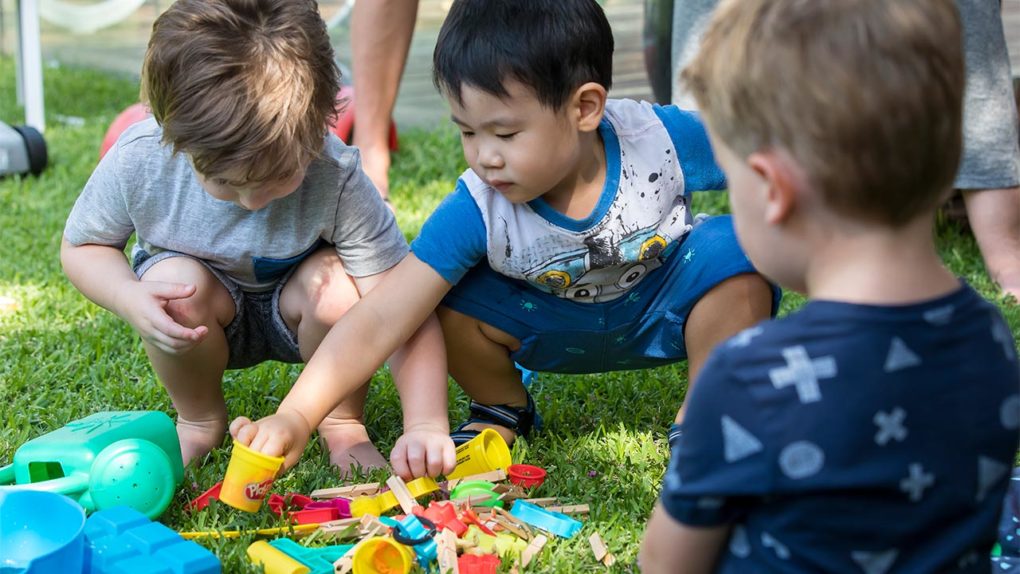No one ever said raising little humans was going to be easy, but until we became parents, we didn’t realize the strength it would take. One day you’re teaching your baby how to eat and the next you’re having hard conversations about something they saw on the news.
Here at Is This Normal, we don’t pretend to have answers to all the questions that come with parenting, but we strive to make your life easier. To provide you with resources for every stage of child rearing, connect you with parents who’ve been there, and yes, answer some of the burning questions that keep you up at night (when your baby isn’t).
So, when it comes to approaching topics like children and families with disabilities, we’re not experts. We have so many of the same questions as you—How do I talk to my kids about respecting those with disabilities? What do I say to my friend whose child just received a diagnosis? What do I do when my kid makes a comment about someone who looks different?
Our best advice: go directly to the source.
Occupational Therapist, Lindsay Altman, who works at a private school that caters to children with a range of neurodevelopmental disorders, stresses the importance of seeking out answers directly from the neurodiverse community itself.
“I’ve been taking time to listen to podcasts and seek advice from self-advocates. My colleagues and I have dedicated ourselves to broadening our understanding of neurodiversity and are working to become strong allies. Taking the time to listen and learn is the best thing we can do to support the neurodiverse community. It’s about going beyond awareness and moving to acceptance. The autistic community and others who are neurodiverse have the lived experience and therefore much insight to offer.” When choosing resources or making donations, be sure to do your research. Look for organizations which support self-advocacy and amplify the voices of the communities that they serve.
So, directly to (one) source we went—to a parent who knows intimately what life with a special needs child is like. We sat down with Maya Krueger, a single parent, special educator, and special needs advocate to learn a little more about how to talk to our children and other parents about children with disabilities. Through her company, Circletime NYC, Maya is dedicated to improving the lives of families with children with disabilities.
How can I support a friend whose child has recently been diagnosed with a disability? What do I say? What can I do?
When a parent first learns of their child’s disability, they typically go through all of the stages of grief. Beginning with the shock and denial phase, when they will be imagining that this is temporary and that the experts don’t really understand their child, working through guilt, anger, depression and ultimately to a place of acceptance. It’s important that as a friend, you give the parent room to process and work through their feelings. Telling them that “It’s going to be ok” is not really very helpful. They will need someone to listen. “What can I do for you?” is a better place to start.
As time moves forward, as a friend, you might notice the emotional toll special needs parenting takes. Maybe offer your time to share in the burden and give your friend a break. As a parent of a child with Autism, I know that as his challenges increased, my relationships with friends suffered as he required more and more of my attention and focus. Parenting a child with special needs can feel like a full time job. I distanced myself from friends who felt sorry for me (no one wants that!) and from those who just didn’t see what the big deal was (“just take his iPad away!”). Ultimately, I think the best advice I could give in how to be a good friend is to be a good listener and be there with your time, and whatever you do, don’t try to fix it!
What do you wish other parents knew about raising kids with disabilities?
It’s not sad!!! Please don’t feel sorry for me! Also, I am not a superhero! Nothing is more annoying than when someone will tell me that I am doing a great job and that the universe chose me for this job because I could handle it and I would be good at it. Special needs parents rise to the occasion because they have to!
That being said, speaking for myself, my life is not somehow “less” than it would be if I had two neurotypical children. It’s just different. I don’t cry more (don’t all moms cry in the bathroom at the end of the day?), I just cry about different things. Also, we are tired. Very, very tired. Getting shoes on a typical kid is hard. Getting shoes on a kid with sensory issues is impossible but somehow it gets done (but if it doesn’t, please don’t judge me because I took my child out in the stroller without shoes in the middle of winter—we are just going 2 blocks and he will not get frostbite!!).
What do you wish other parents taught their children about kids with disabilities?
Trends come and go about celebrating disabilities, normalizing disabilities, equity for those with disabilities. Ultimately, what matters is respect. Everyone, young and old, parents and their children should have an open heart and respect for all people, especially people who are not like themselves. It’s ok to ask questions if they come from a respectful place. Children should be taught that people come in different shapes and sizes and colors and styles. No one is better than anyone else. If they understand that all children are doing the best they can, they will be more open to including them and carving out creative ways in which they can play together. Understanding children who are different from themselves can only serve to expand their understanding of the world we all live in together and create a kinder more empathetic child. The opposite of otherizing is what parents need to teach their children about kids with disabilities.
How do we raise children in a way that makes them compassionate about kids with disabilities and differences?
If we adults aren’t afraid to answer difficult questions, we will all benefit from the journey of trying to understand differences together. So often, it is really the parents who need to learn to have the conversations, not the kids. Kids are naturally curious and open to new ways of understanding each other. It is the adult fear of offending someone or behaving outside traditional norms that diminishes the ability to have open conversations, that causes adults to separate their children and avoid uncomfortable situations.
It is important that children feel safe to ask the questions so that they can learn how to be a friend to a child who may have a disability or learning difference and that their learning and friendship can be a mutual experience. It’s a mistake to teach them that some people can’t do something and that we should “help them and be kind.” That’s the wrong message. The message should be, not everyone is good at all things and that is not a reason to exclude them from your world. That child with a disability may just be the best friend your child was looking for.



